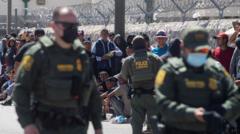In a bold move that intensifies the already heated immigration discourse, Texas authorities have proposed offering President-elect Donald Trump a substantial 1,400 acres of land in Starr County along the US-Mexico border. This land is intended for the development of facilities aimed at processing and detaining undocumented migrants, part of Trump's overarching strategy to conduct mass deportations of what he describes as "violent criminals."
Texas Proposes Land for Trump's Migrant Detention Vision

Texas Proposes Land for Trump's Migrant Detention Vision
Texas officials extend a controversial offer of land to President-elect Trump for constructing migrant detention facilities amid ongoing immigration debates.
The letter from the Texas General Land Office highlights the urgency of this initiative, emphasizing the state’s commitment to supporting Trump's promises regarding border security. This offer was sent directly to Trump's Mar-a-Lago estate in Florida. It underscores the complexities of the current immigration landscape, particularly in light of both logistical challenges and potential legal ramifications from advocacy groups opposing mass deportation.
Texas Land Commissioner Dawn Buckingham expressed her full endorsement during an interview, indicating that the offered land—previously denied for a border wall—would be ideally suited for the construction of detention centers. In light of these developments, while Texas solidifies its alignment with Trump's administration, Democratic governors in neighboring border states like California, Arizona, and New Mexico are signaling their intent to resist participation in mass deportation efforts.
Transition spokeswoman Karoline Leavitt emphasized the eagerness among local officials for Trump's return to the Oval Office, reaffirming that he would leverage all available resources to fortify border security and execute massive deportation operations. The design and structure of potential new facilities remains uncertain; suggestions include both traditional brick-and-mortar buildings and more temporary soft-sided camps.
Concerns about the feasibility of these large-scale operations are voiced by experts, especially given the significant number of undocumented immigrants currently detained by Immigration and Customs Enforcement (ICE). As of early November, a report indicated nearly 39,000 detainees, with over 12,000 in Texas alone.
As the Biden administration continues to allocate resources for immigration enforcement, a contrast in approaches between Republican-led states and their Democratic counterparts may deepen the divide in immigration policy across the United States. Analysts warn that this divergence could lead to disparate protections and treatment of migrants, particularly if national deportation strategies push for rerouting of detainees from Democratic states to facilities in Republican ones. The implications of Texas’ offer not only raise questions about the handling of migration in future administrations but also highlight the ongoing debate over state versus federal responsibilities in immigration policy.
Texas Land Commissioner Dawn Buckingham expressed her full endorsement during an interview, indicating that the offered land—previously denied for a border wall—would be ideally suited for the construction of detention centers. In light of these developments, while Texas solidifies its alignment with Trump's administration, Democratic governors in neighboring border states like California, Arizona, and New Mexico are signaling their intent to resist participation in mass deportation efforts.
Transition spokeswoman Karoline Leavitt emphasized the eagerness among local officials for Trump's return to the Oval Office, reaffirming that he would leverage all available resources to fortify border security and execute massive deportation operations. The design and structure of potential new facilities remains uncertain; suggestions include both traditional brick-and-mortar buildings and more temporary soft-sided camps.
Concerns about the feasibility of these large-scale operations are voiced by experts, especially given the significant number of undocumented immigrants currently detained by Immigration and Customs Enforcement (ICE). As of early November, a report indicated nearly 39,000 detainees, with over 12,000 in Texas alone.
As the Biden administration continues to allocate resources for immigration enforcement, a contrast in approaches between Republican-led states and their Democratic counterparts may deepen the divide in immigration policy across the United States. Analysts warn that this divergence could lead to disparate protections and treatment of migrants, particularly if national deportation strategies push for rerouting of detainees from Democratic states to facilities in Republican ones. The implications of Texas’ offer not only raise questions about the handling of migration in future administrations but also highlight the ongoing debate over state versus federal responsibilities in immigration policy.























